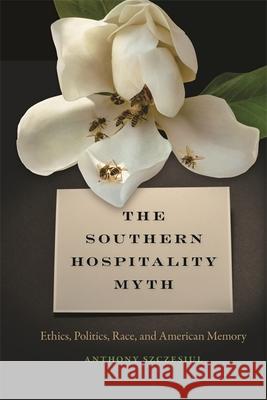Southern Hospitality Myth: Ethics, Politics, Race, and American Memory » książka
Southern Hospitality Myth: Ethics, Politics, Race, and American Memory
ISBN-13: 9780820332765 / Angielski / Twarda / 2017 / 310 str.
Southern Hospitality Myth: Ethics, Politics, Race, and American Memory
ISBN-13: 9780820332765 / Angielski / Twarda / 2017 / 310 str.
(netto: 328,09 VAT: 5%)
Najniższa cena z 30 dni: 301,64
ok. 16-18 dni roboczych.
Darmowa dostawa!
Hospitality as a cultural trait has been associated with the South for well over two centuries, but the origins of this association and the reasons for its perseverance often seem unclear. Anthony Szczesiul looks at how and why we have taken something so particular as the social habit of hospitality which is exercised among diverse individuals and is widely varied in its particular practices and so generalized it as to make it a cultural trait of an entire region of the country.Historians have offered a variety of explanations of the origins and cultural practices of hospitality in the antebellum South. Economic historians have at times portrayed southern hospitality as evidence of conspicuous consumption and competition among wealthy planters, while cultural historians have treated it peripherally as a symptomatic expression of the southern code of honor. Although historians have offered different theories, they generally agree that the mythic dimensions of southern hospitality eventually outstripped its actual practices. Szczesiul examines why we have chosen to remember and valorize this particular aspect of the South, and he raises fundamental ethical questions that underlie both the concept of hospitality and the cultural work of American memory, particularly in light of the region s historical legacy of slavery and segregation."
Hospitality as a cultural trait has been associated with the South for well over two centuries, but the origins of this association and the reasons for its perseverance often seem unclear. Anthony Szczesiul looks at how and why we have taken something so particular as the social habit of hospitality which is exercised among diverse individuals and is widely varied in its particular practices and so generalized it as to make it a cultural trait of an entire region of the country.Historians have offered a variety of explanations of the origins and cultural practices of hospitality in the antebellum South. Economic historians have at times portrayed southern hospitality as evidence of conspicuous consumption and competition among wealthy planters, while cultural historians have treated it peripherally as a symptomatic expression of the southern code of honor. Although historians have offered different theories, they generally agree that the mythic dimensions of southern hospitality eventually outstripped its actual practices. Szczesiul examines why we have chosen to remember and valorize this particular aspect of the South, and he raises fundamental ethical questions that underlie both the concept of hospitality and the cultural work of American memory, particularly in light of the region s historical legacy of slavery and segregation."











